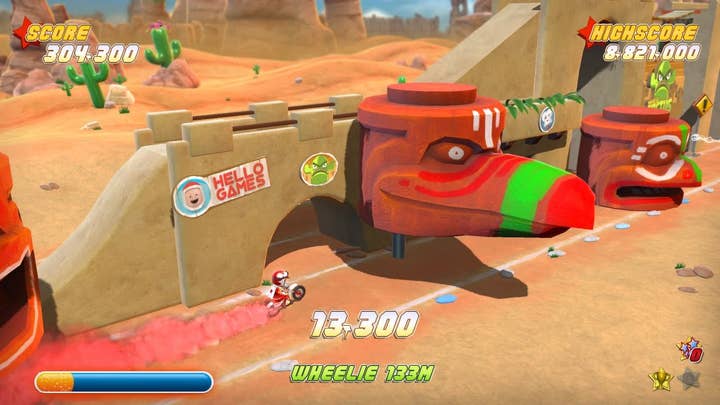You Had Me At Hello
Hello Games' Sean Murray on the teething pains of indie development, and how to love a project after six months
Sean Murray and Hello Games are one of the more modest indie success stories. Not modest in terms of achievement, but very much so when it comes to shouting about it. The studio's debut title, Joe Danger, saw a success on PSN which allowed the company to expand and make new hires at its Guildford office for a new project, still very much under wraps.
Success brings exposure, and Sean himself is now a regular speaker on the conference circuit - a phenomenon which he says "must mean I'm a terrible coder - they just want me out of the office." GamesIndustry.biz caught up with the CEO after his opening keynote for the indie games track at Develop earlier this month, to see what advice he had for people looking at indie development.
Well it's a funny one, indie games, isn't it? It's the tortured artist. The tortured artist isn't a great place to be but it's also an aspirational place to be in some ways. Everyone wants to be the tortured artist because it implies that you're producing great art.
It's almost people glossing over the realities of being on the breadline and starving. That kind of thing. Chopping your ear off. It's seen in a whimsical way, in a fantasy way. The reality of chopping your ear off is probably quite grim.
So I don't want to de-romanticise indie development because I have a great love for what it is we do and I want people to get involved in indie gaming and be interested in indie development, but I do think the details are interesting, and I do think it's important for people to hear what those realities are.
I think what I was saying in the talk was that I went in completely unprepared for any of those realities. As they hit me one by one I thought, 'I'm the only person who's ever been through this. Therefore, I must be doing everything wrong. It means my game is wrong. Terrible.'
It meant that I wasn't cut out for that sort of development. I expected indie development to be making games in a wooded glen. Ideas coming to me in my dreams, from looking at the shapes of clouds, that inspiring me to create beautiful art. It would be done in a week, that was a key point as well.
I think that's the single biggest thing that people don't talk about. That any game idea, or any project in life, pretty much - after the first few weeks makes you doubt whether it's a good idea.
I think it's the same sort of thing! I actually got a guitar when I was about 14 I think. It was really hard to play, initially everything I tried to play sounded terrible and I felt that meant that I should give up because no great guitarist has to go through that. It's much smoother and easier, pretty much instantaneous for them. [laughs]
I think probably the biggest thing for me was leaving a job which was 9-5 that I'd stopped enjoying as much, and then doing something full-time which I had up until then been doing in my spare time, at the weekends.
I'd been making little games, and prototypes. Exploring, funny though this sounds, programming! Solving nice problems that I didn't get a chance to do at work. I'd been doing that side of things and that's what I expected it to be like. I expected to do full-time what I'd been doing part time.
That, to me, sounded amazing. Like the easiest week's work I could possibly have.

The reality is that, unlike when you're doing it in your spare time, when you're doing it full time, no matter what it is, it does become different. You do go through those phases of doubting what you're doing. Of disliking what you're doing.
I think that's the single biggest thing that people don't talk about. That any game idea, or any project in life, pretty much - after the first few weeks makes you doubt whether it's a good idea.
When that hit me I thought, well that's because it must be a terrible game idea. It's because I'm not cut out for this. I think that was the single biggest shock, definitely. Only by talking to other people did I realise that everyone seems to go through that.
I think people can definitely become an indie developer straight out of university. I think people can not go to university and still be a successful developer.
But like anything in the world, experience helps. I don't know for me personally, how I would have done what I am doing now had I not had that experience. Because starting a proper games job is in itself a huge shock. Probably doing that alone taught to work 9-5, having been a student for a few years.
But it's definitely a very valuable thing. From the few statistics I gathered for my talk today, that was a trend. Those that were doing the best, that was a common factor. That they were university educated, that they were multi-disciplined, that they had a lot of experience in what they were doing, in whatever form. That really isn't that surprising.








